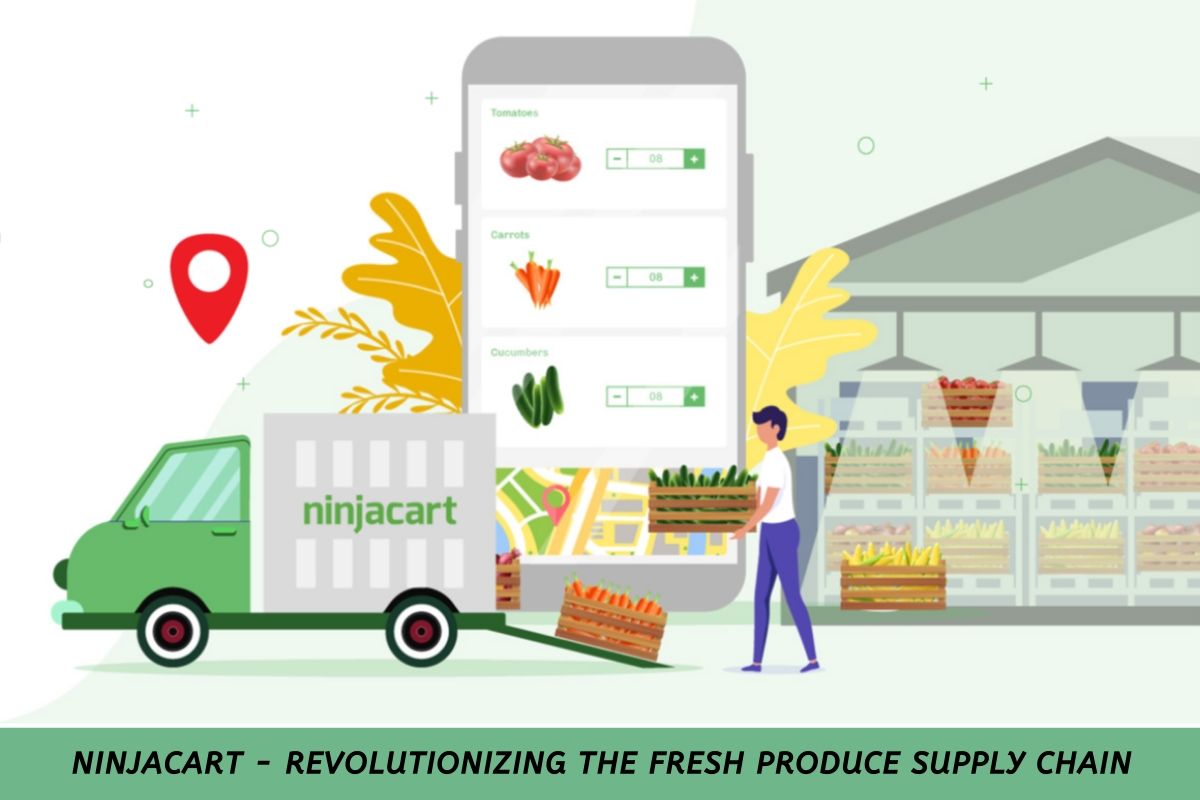More than 500 tonnes of fruits and vegetables are delivered to around thousands of shops across India within a few hours, thanks to the agritech startup Ninjacart. Ninjacart is a tech-enabled supply chain providing farm-fresh products to retailers, and they currently boast of a delivery accuracy rate of 99.98% throughout the year, without taking a single day off.
Behind the growth of Ninjacart lies a pure augmentation of hard work, a deep sense of the market situation and implementing cutting-edge technology as a means to the end. All these attributes are focussed on achieving only one thing- accelerating efficiency and culling any low-belt thefts involved in distribution of farm-fresh products.
Ninjacart, a four-year-old startup, was launched with a sole focus on the B2C segment (business-to-consumer). However, as time passed, they quickly realised that there are too many competitors in that segment, which won’t be viable for the company in the long run. The business model then pivoted to catering to the B2B segment. Their focus was on providing fair prices to everyone involved.
The story of the chain
Ninjacart’s aim is to mend the broken supply chain with their technology expertise. The sole reason behind Ninjacart’s high accuracy of deliveries is their precise predictions. The company’s first step was to have a clear understanding of the harvest calendar, which would provide the team a fundamental idea of the availability of fruits and vegetables in a given season. Ninjacart used this fundamental prognosis as a note of expectation for the farmers they source their goods from.
The next step was to convey the retailers the expectation they should reserve by analysing the previous purchase records, which helps them figure out a pattern and focus only on those goods which the retailers (in this case, Ninjacart’s customers) need as soon as possible.
Technology at the helm
Ninjacart has always stressed on the augmentation of technology as the key to its efficiency. It educates the farmers on the freshest desired quality and the produce is transported to the collection centers, once it is harvested.
The startup has around 7,000 farmers in its network. However, on an average, only 2,000 farmers are a part of the monthly transaction. Some farmers travel up to 400 kms to drop their produce, and the drop is always made between 4pm to 6pm. Payment is also done on an immediate basis, once the produce is weighed and tagged. A message is relayed through an application and the price money is credited to the farmer’s account within the next day.
Ninjacart then moves on to transporting the crates to the fulfillment centers The company introduced devices like dolleys, which helps in loading and unloading of the crates at a faster rate than the manual lifts. The entire process is monitored through an application to ensure fluidity and high efficiency.
The dynamics of Ninjacart’s supply chain system
Ninjacart is different from other logistics businesses when it comes to sorting and separation systems. The system is bound to make any supply-chain expert awestruck, as Ninjacart does not implement any manual convention for segregation and everything is backed by an application. Every crate comes with a radio frequency ID tag so that the company is informed about the lots delivered as the crates are loaded and transported to the distribution centres.
Over the past few years, Ninjacart has also undergone a massive expansion of operations. From seven tonnes a day in 2016 to 500 tonnes+ now, the company’s abilities have grown multifold. It now operates from several cities apart from Bengaluru- Chennai, Delhi, Mumbai and Hyderabad. It also plans to roll out its services in Pune and Ahmedabad as well.
With increased handling pressure, the company has also managed to adapt to the complexities of handling larger volumes of fresh-farm products.
Future challenges
Ninjacart had to overcome a lot of difficulties and hurdles to match the increased handling pressure. From ensuring a fair price to the people involved with Ninjacart to bring in safeguards to prevent theft, the company has definitely come a long way. They have implemented technology to make their supply chain absolutely foolproof. For example, they have implemented tamper-proof tags to their crates so that there is no pilferage whatsoever. The shop owner will be able to access the crates once the OTP provided by the app is exchanged.
They now cater to almost 8,500 customers as opposed to 150 in 2016, with 5,000 deliveries made on a daily basis. The application platform also provides the shortest routes to the truck drivers transporting the crates so that delivery is ensured within stipulated time.
Conclusion
Ninjacart is implementing whatever resources they have in hand to ensure that farm-fresh products are delivered to their customers, without any error or slack on their part. Ninjacart was quick enough to adapt itself in the food logistics business, which does not have any dearth of competitors.
Startups like Ninjacart are also proving to be beneficial during these tough times, and it is still ensuring that the consumers have access to fresh produce- irrespective of the impact the current lockdown has imposed.
Ninjacart Fresh Supply Chain Fruits & Vegetables Funding AgriTech Startup India Investment Agriculture

